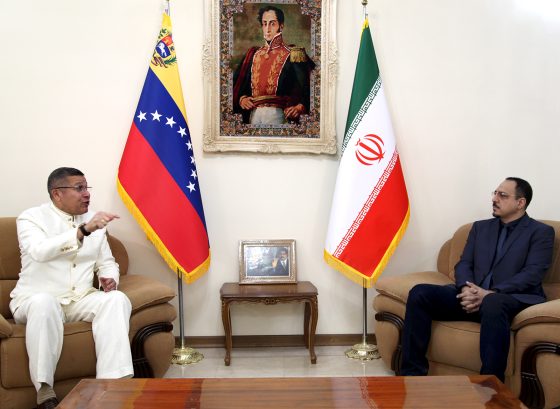“Pakistan Stands by Justice and Fairness” Highlights the President of ECO Cultural Institute

Dr. Saad Khan, the president of ECO Cultural Institute, while expressing solidarity with the Iranian nation and firmly condemning the 12-day Israeli aggression, emphasizes the role and responsibility of cultural institutions at critical historical moments. He reminds us that culture is not merely a platform to display artistic beauty and manifestations, but also in war times and crises, these institutions are tasked to break the silence and take the side of the truth. Dr. Saad Khan, as a prominent Pakistani diplomat, in an interview with AVA Diplomatic, tries to present a comprehensive image of Pakistan; an image not only based on military power, but also on the cultural, historical and moral assets of the country and introduces them to the international community. By referring to the different aspects of the recent conflict between India and Pakistan, he emphasizes the necessity of compounding power with moral principles, and believes highlighting human values in the field of international relations is an undeniable essential.
AVA Diplomatic’s Exclusive Interview with
Dr. Saad S. Khan, President of ECO Cultural Institute
During the 12-day Iran-Israel war, some Pakistani high officials including the Speaker of the National Assembly and the Defense Minister of Pakistan took strong positions against Israel. What message does this public support for Iran send to the international community and Islamic countries?
During the Israeli aggression against the Islamic Republic of Iran, the President of Pakistan, the Prime Minister of Pakistan and our powerful Army Chief, in addition to the high dignitaries you mentioned, clearly and unequivocally supported Irans’ right to defend itself and condemned unprovoked attacks and countrywide assassinations carried out against Iran. This has given a strong message to the world community that Pakistan is a nation that stands by justice and fairness.
My great country has stood by the countries who face aggression anytime anywhere in the world, including those nations which regrettably stood neutral during the recent Indian aggression against Pakistan in May 2025. For us, support of territorial integrity of our brotherly nations, or any nation-state in the world for that matter, is not a transactional activity that we will support only those countries who support our rightful position on the issue of Jammu & Kashmir. However, one can expect that our brotherly nations will consider taking a more unequivocally supportive position on the rights of the Muslims of Jammu and Kashmir living under Indian occupation.
Mr. Saad Khan, in the light of Pakistan’s Senate passing a resolution condemning Israel’s aggression against Iran, how can the ECO Cultural Institute use the tools of cultural diplomacy to strengthen solidarity among Islamic member states and promote a message of peace against such aggression?
Unfortunately, many states have yet to realize that wars are won or lost in the minds. The most important tools of conducting warfare today are information and culture. As a famous English proverb “give a dog a bad name, then hang him” suggests that before attacking a nation, other states first try to malign it by calling it a rogue state. Many people closely following the unfolding developments of the past few weeks opine that if there had been a strong public opinion in the US and Europe against Israeli actions in the region, the aggressors might have found it difficult to launch the 12-day war.
The most important organization at least for this region is the ECO. And the ECO Cultural Institute, as its cultural agency, has been promoting the soft image of Iran, of Turkiye, of Pakistan, of Azerbaijan and all other member states by projecting their music, arts, paintings and films etc. I think strengthening cultural cooperation will always be a win-win situation for all member states. I emphasize the case for strengthening the ECI once again in the best interest of the host state and all the member states.
What impact will the 12-day Israeli aggression on Iran, as an Islamic country, have on the cultural and Islamic identity of ECO member states? What measures will the ECO Cultural Institute take to preserve and strengthen this identity against such threats? Have Israel’s attacks on Iran negatively affected the atmosphere of trust and cooperation required to advance ECO’s cultural programs?
One the first day of the 12-day war, the ECI had suspended all its planned cultural activities as a mark of respect and solidarity to the innocent lives lost in Israeli bombings and the target assassinations of the military leaders and scientists of Iran. The ECI works in a tough regional environment. On the one hand, it is mandated to promote music and arts of the member states. On the other hand, it cannot hold any musical activity when one of the ten member states are mourning their losses.
In the last year 2024, we saw the martyrdom of President Raisi, the Hezbollah leader Hassan Nasrollah, the former Palestinian Prime Minister Ismael Haniyeh on Iranian soil, and each time we cancelled tens of activities during the forty day mourning period for each departed leader. This time also, we cancelled many programs that will remain so until the situation improves.
Thus, the ECI and its cultural activities get affected by each political development. We want to hold more activities but not when any event may hurt the human sensitivities. However, I can assure you that the wars, conflicts and challenges have strengthened the ECI’s resolve to preserve and promote the cultural identity and heritage of our member states.
As a seasoned diplomat, how do you assess the role of the Organization of Islamic Cooperation (OIC) in responding to this war? Could OIC take a more active stance?
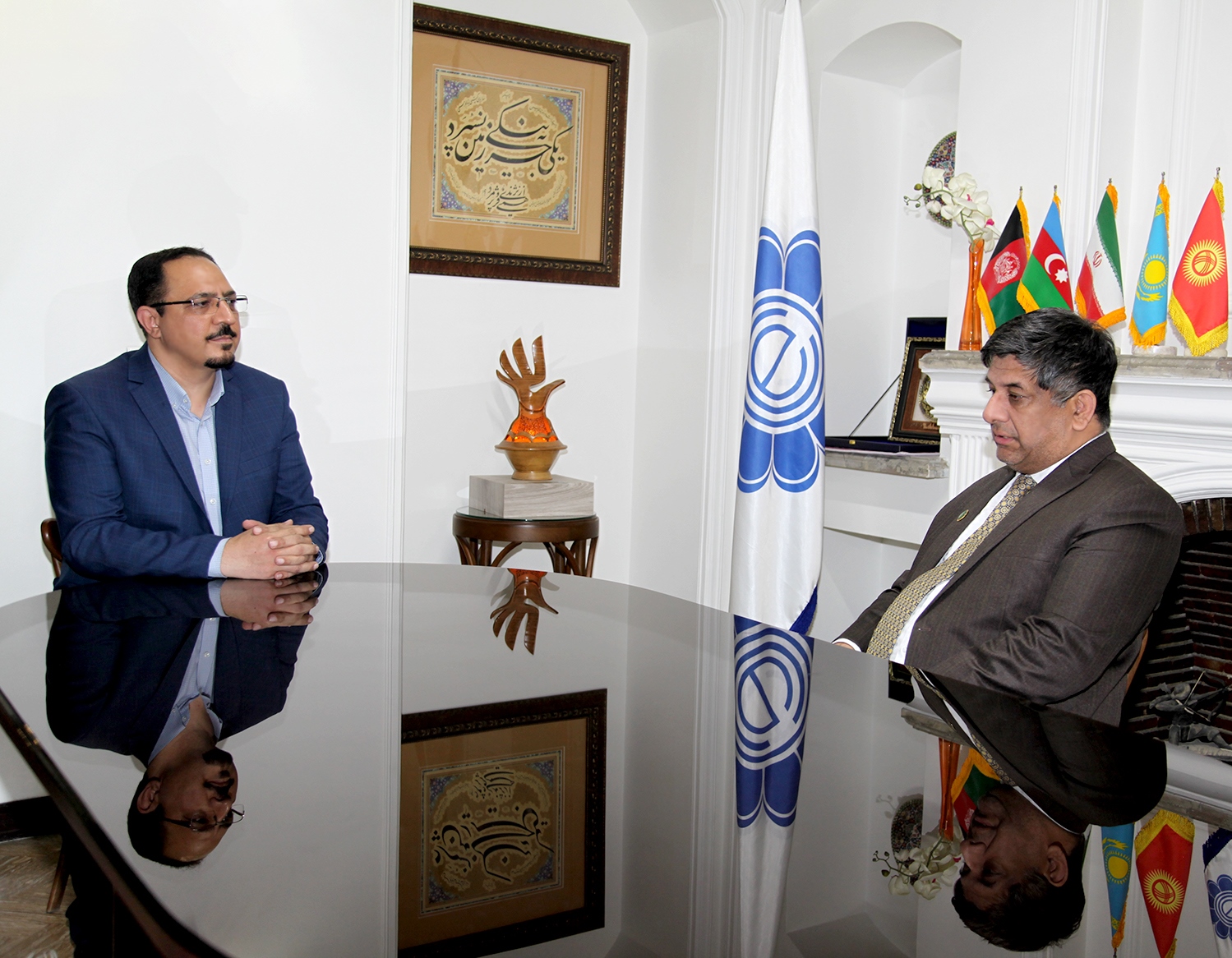 As a humble student of international relations and diplomacy, during my professional and academic career spanning over three decades, I have noticed a gradual weakening of the importance of international organizations. Even the United Nations’ role such as in the ongoing genocide in Palestine or the crimes against humanity being committed by Indian forces in Jammu and Kashmir, is marked by inaction and impotence. Similarly, the Organization of the Islamic Cooperation (OIC) is not operating in vacuum. It is functioning in the same world of realpolitik where nation states have resumed their pre World War focus on national interests at the cost of transnational cooperation. I think for the OIC to function as a vibrant forum, it is imperative that it is not under the influence of a handful of member states. A robust, independent OIC can be a voice of the Muslim world on all global forums, which is hardly the case at present. However, to OIC’s credit, one must point out the strong position it took against Israeli aggression in its emergency meeting in Istanbul last week.
As a humble student of international relations and diplomacy, during my professional and academic career spanning over three decades, I have noticed a gradual weakening of the importance of international organizations. Even the United Nations’ role such as in the ongoing genocide in Palestine or the crimes against humanity being committed by Indian forces in Jammu and Kashmir, is marked by inaction and impotence. Similarly, the Organization of the Islamic Cooperation (OIC) is not operating in vacuum. It is functioning in the same world of realpolitik where nation states have resumed their pre World War focus on national interests at the cost of transnational cooperation. I think for the OIC to function as a vibrant forum, it is imperative that it is not under the influence of a handful of member states. A robust, independent OIC can be a voice of the Muslim world on all global forums, which is hardly the case at present. However, to OIC’s credit, one must point out the strong position it took against Israeli aggression in its emergency meeting in Istanbul last week.
Dr. Saad Khan, as a distinguished Pakistani diplomat and historian, you are presiding over the ECO Cultural Institute. Please let us know how this background has influenced your approach towards cultural diplomacy as well as strengthening cooperation among ECO member states?
According to the Charter, the position of President ECI is not reserved for a diplomat, but for an “eminent cultural dignitary” of the region. I think my academic background that is wholly in International Relations and International Law, coupled with three decades of governmental experience is complimented by the fact, that I am a Historian, a writer and a music-lover. Even as I plan to leave the ECI, I look back with full satisfaction that this is not the ECI that I was entrusted with, two years back. It has taken giant leaps forward for my successor to take over.
What have been the most important achievements of the ECO Cultural Institute in Iran during your presidency?
I think in the past two years, the ECI has become visible to the people of Iran, to the diplomatic community and to all member states like never before. The number of activities we held last year (2024) were more than the previous seven years combined. This was despite tense regional situation, Israeli attacks, the martyrdom of the President of Iran, the assassination of ex Palestinian Prime Minister Ismail Haniye, and all developments, that affected our events and tens of them had to be cancelled or postponed. Still our events were numerous enough to produce a 200-page activity report—a statutory requirement that had not been fulfilled for years. We published books, translated others, brought out cultural heritage magazines, launched language training courses, updated new website in English, Persian and Russian, made documentaries and engaged all ten ECO member states in cultural diplomacy and dialogue.
Considering your statement that “ECI arrears run into three times its annual budget,” what impact has this situation had on the implementation of the institute’s programs and achieving its goals, and what measures have you devised to address this financial challenge?
The ECI is now a financially robust organization. Gone are the days, when salaries ran into eight year arrears, when artists were not paid for their exhibition on the plea of funds shortage, or when ECI could not attend international meetings because it did not have money to pay for tickets of its employees. Strict financial discipline, prudent management of human resource and visible activities convinced member states to pay dues and during my tenure, ECI never faced any financial crisis. I think if the countries, especially the host state, only pay back the arrears, the ECI can make wonders on the cultural landscape.
Has Pakistan been able to utilize ECO Cultural Institute to promote its soft image in the region and beyond? How can other member states benefit from this platform to showcase and promote their cultural capacities?
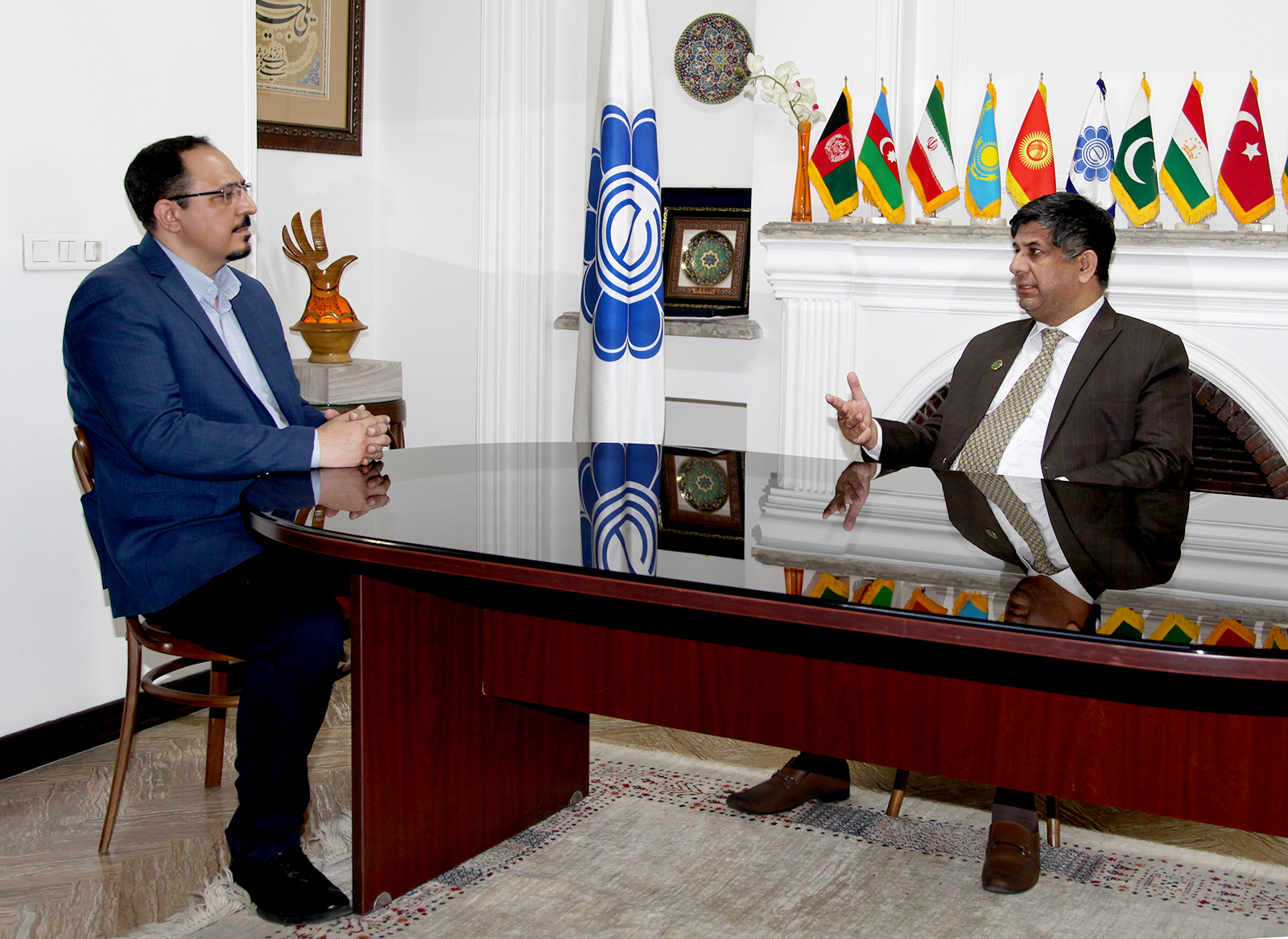 ECI is the platform that can be utilized by all then member states, including the host state, not just Pakistan, to promote soft image. Before joining the ECI, even me as a cultural figure of the region was unaware of the cultural richness of Iran, Türkiye and all member states. I urge all member states to capitalize the potential of this great institution to show case the softer side of their cultural diversity.
ECI is the platform that can be utilized by all then member states, including the host state, not just Pakistan, to promote soft image. Before joining the ECI, even me as a cultural figure of the region was unaware of the cultural richness of Iran, Türkiye and all member states. I urge all member states to capitalize the potential of this great institution to show case the softer side of their cultural diversity.
Pakistan is already very strong in its soft image. Our founder Mohammad Ali Jinnah and our poet Allama Iqbal Lahori are household names in the Muslim world. Our Indus valley civilization is thousands of years old, and contemporaneous of Egyptian and Babylonian civilizations. Pakistan defeated India in the battle of narratives in the recent mini-war of May 2025 because of the strength of historical, cultural and anthropological roots.
The historical conflicts between India and Pakistan, including past wars, have undoubtedly had profound effects on the cultural, social and psychological mindset of the people of both countries, as well as the wider ECO region. From the viewpoint of the ECO Cultural Institute, how can cultural and artistic tools be taken advantage of to heal the wounds of the past, promote mutual understanding and build bridges for a more peaceful future between nations, especially the younger generations?
Culture brings people together. E.C.O is only an organization of Muslim states and the non-Muslim states on the periphery of the ECO region, like India or some states in the Caucus have never been part of it. You must note that because of cultural affinity, these ten nations have never gone to war with each other in the contemporary history. The case of India is different; Pakistan and India separated as two countries in 1947 on the basis of two-nation theory of our leader Jinnah that states that Muslims and Hindus are two separate nations with different cultures, ways of life and aspirations.
ECO Cultural Institute seeks to strengthen the shared cultural heritage and identity among its member states. Given the deep historical and cultural ties between the people of Pakistan and countries such as Azerbaijan and Türkiye, as well as the spiritual and cultural support these countries have shown to Pakistan during hard times, what programs does the this Institute have in progress or propose to highlight these historical and cultural ties and use them as a successful model for greater solidarity in the ECO region?
Prime Minister of Pakistan was on a four-nation tour of Iran, Türkiye, Azerbaijan and Tajikistan to show our gratitude to these friendly nations for their support during Indian aggression against us. This is to be noted that all these nations are E.C.O members with whom Pakistan has historical, cultural and religious ties binding us for hundreds of years. I think the ECO is already a success model of cooperation based on cultural affinity. And ECI is strengthening these bonds.
Why do Türkiye and Azerbaijan explicitly support Pakistan in the Jammu & Kashmir dispute and other disputes between India and Pakistan, including the recent war? What are the historical, cultural, religious, or geopolitical roots of this support?
It is because of the morality based foreign policy of these countries. All three of us have faced aggression in the past century or so. Cyprus dispute, the Karabakh dispute, the Jammu & Kashmir dispute, all had a thing in common—alien occupation of a part of the lands that required strong concerted action. The State of Azad (free) Jammu & Kashmir,(AJK) the Turkish Cypriot State (TCS) as well as the whole Karabakh region, were not given to Pakistan, Türkiye and Azerbaijan, respectively, on a plate. There is a history of struggle to regain the honor and respect in the world community by showing the muscle and resolve of our nations.
How would you summarize the recent meeting of Pakistani Prime Minister Shahbaz Sharif with the Supreme Leader Ayatollah Ali Khamenei?
Pakistan’s Prime Minister’s visit to Iran Last month is reflective of the historic ties of friendship between the two nations. His meeting with the Supreme Leader was very fruitful. The Supreme Leader talked about both economic and cultural cooperation and specifically mentioned ECO as a forum to promote such cooperation. We appreciate the attention given to ECO by the Leader.
What was the purpose of Pakistani Prime Minister’s Visit?
Pakistan is on a diplomatic offensive since its win over India in the military operations, we called “Bunyaan un Marsoos”—a term taken from the Holy Koran. We were able to defend our motherland against totally unprovoked criminal aggression against Pakistan by a country six times larger than us. One can call it a miscalculation by India about their military capacity and their misreading of Pakistan’s will to defend its sovereignty.
You say it was a win for Pakistan while India is claiming the same. How do you support your assertion?
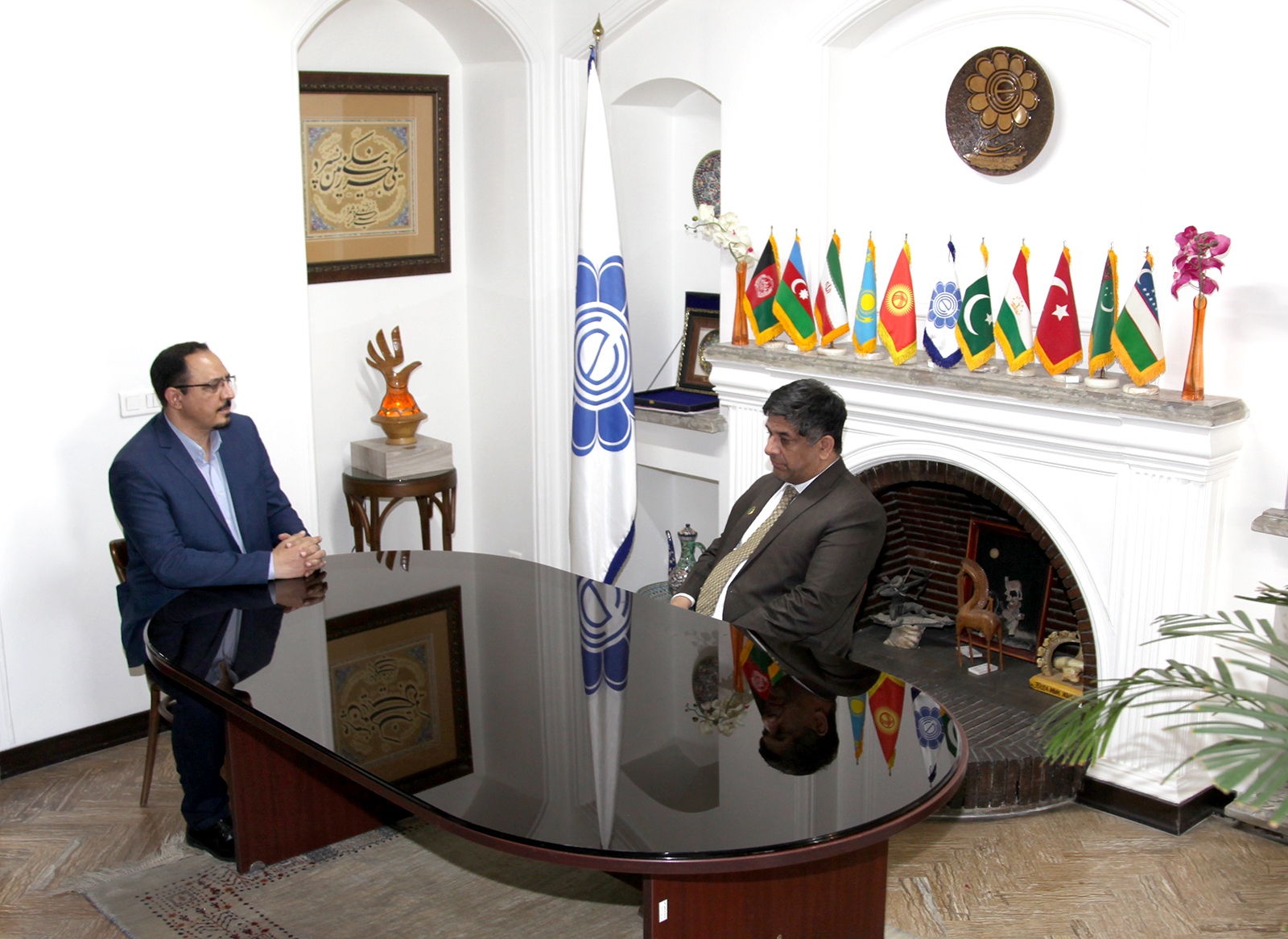 Ordinarily, the very fact that a much smaller state and army is able to withstand and survive attack by a superior power would be counted as victory. However, in our case, they saw our capacity for absorbing their attack and launching counter offensive. On top of it, they had to sue for, or agree to, a ceasefire on the basis of military and political equality.
Ordinarily, the very fact that a much smaller state and army is able to withstand and survive attack by a superior power would be counted as victory. However, in our case, they saw our capacity for absorbing their attack and launching counter offensive. On top of it, they had to sue for, or agree to, a ceasefire on the basis of military and political equality.
Although we defeated them in air and land battles, our most important victory is the moral one. India’s accusations against Pakistan regarding the Pahalgam incident remained unsubstantiated; while their unleashing of state terrorism in the occupied Jammu & Kashmir, bulldozing houses of Pakistan sympathizers, illegally detaining 2,800 Kashmiri civilians (all of them Muslim) with reports of severe and systematic torture, and finally attacking Pakistani mosques and schools leading to the death of mostly women and children, have given us a moral superiority like never before in recent history. We got all our aims for the four-day war imposed on us, and they got none. What else is Victory in the war, if not all the above!
South Asia is the world’s nuclear flashpoint, but India says that it will not come under, what they call, Pakistan’s nuclear blackmail. How do you respond to that?
Nuclear war is the worst calamity that a conflict can bring. The very fact that India has launched aggression against Pakistan using the excuse of Pulwama (2019) and Pahalgam (2025) is a clear testimony to the fact that India recognizes Pakistan as a responsible state and understands that we will not use our nuclear arsenal against their or any state’s civilian population.
You say that India does not honor its Muslims but their daily military briefings during the “Operation Sindoor” were led by a Muslim military officer. How would you respond to that?
The optics of the daily press briefing drama of Indian Foreign Secretary, Vikram Misry, a Hindu by faith, being assisted by a lady in Indian army uniform with the Muslim surname Qureshi.
Can having Col Sofia Qureshi as a show piece at the press conference hide the fact that probably this would probably the highest she could get? Can being Indian army’s face shield her from anti-Muslim slur? Even a government minister is ridiculing her as “the sister of terrorists”—not that he found her in a terrorist activity. Only her Muslim sounding name is enough to make her a target of ugly mudslinging.
Indian Prime Minister calls Jammu & Kashmir as an integral part of India. Your comments, please.
Anyone who has any doubt where Jammu & Kashmir belongs to has to spend a day in Sri Nagar or any other city of the Indian occupied parts of the state. It is not about the people chanting “long live Pakistan” slogans under the teeth of Indian repression, even the graves of the people are covered with Pakistani flags. Half of Jammu & Kashmir is already liberated, in the other half, Pakistan is inscribed in the hearts and minds of the people under occupation.
India says they have only hit militant targets in Pakistan and their strikes had been “Precise, Measured, Non-Escalatory” and that Pakistan should not have responded. Do you think Pakistan escalated the conflict by attacks on their military targets?
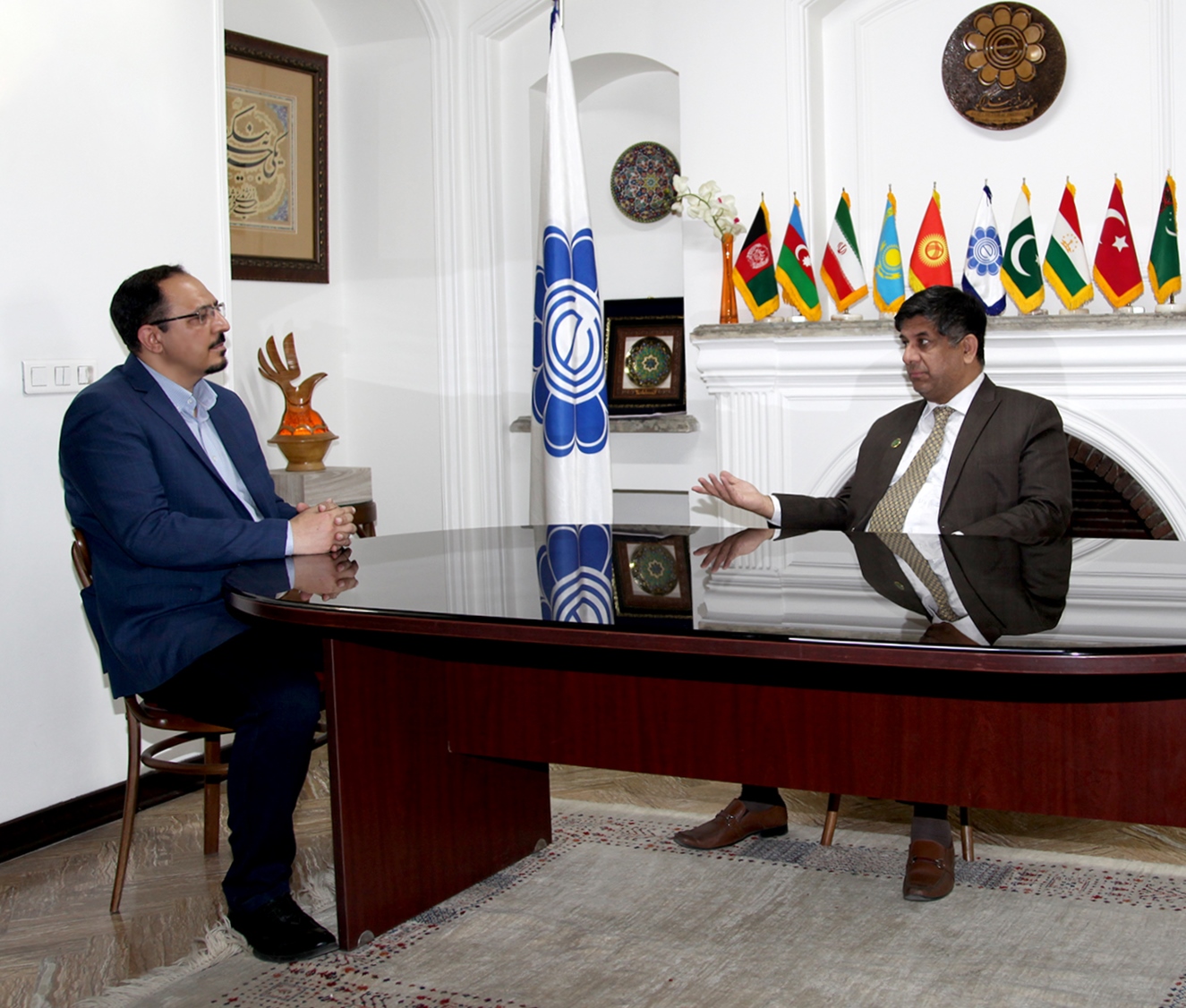 Let me start by asking that attacking six civilian sites (although Indian claim was nine) inside Pakistan could be called non-escalatory. The only other time that international borders were violated in this manner was in the Indo Pak wars of 1965 and 1971 decades ago. Can they attack any other nation like China or Russia by missile strikes, called them “non-escalatory” and then expect not be to be responded to.
Let me start by asking that attacking six civilian sites (although Indian claim was nine) inside Pakistan could be called non-escalatory. The only other time that international borders were violated in this manner was in the Indo Pak wars of 1965 and 1971 decades ago. Can they attack any other nation like China or Russia by missile strikes, called them “non-escalatory” and then expect not be to be responded to.
Indian strikes on mosques and populated areas in Pakistan led to the death of 27 civilians and 13 military personnel. Of the 27 civilians, 15 were children (one as young as two and another at 7), seven women and of six civilian men, one of them as old as 80. It defies logic that a seven year boy in Muzaffarabad or an 80 year old in the southern city of Bahawalpur, had been conducting terrorism in India. I think even the Indians recognize that even the Pahalgam attackers did not touch, let alone kill, even one of the 200 women and children present at the scene. I wish this were true of Indian response as well.
Here I may highlight once again, that Pakistan only downed the planes which fired missiles at innocent targets in Pakistan and blew up their military sites from where their missiles were launched on civilians in Pakistan. We did not attack any temple, hospital, civilian area at all despite gravest of provocation from their side.
As our High Commissioner to UK, Dr Faisal recently said, we can fight you in the war, if you want, but we will not lose our civility. There is no question that we will not say anything disrespectful for their Prime Minister, or their Foreign Secretary or their military spokesperson Col Sofya Qureshi. Indians themselves are enough for this job. You only have to have a short glance at Indian social media how they have been humiliating their political leadership, their Foreign Secretary, and the lady spokesperson.
That said, if the Indian PM can call this duel a victory for him, where after one month they have not denied that six of their IAF jets went down in the opening hours of the air battles, I can only marvel at the creativity and imagination in their definitions of “victory”.
The world has seen that in every aspect of the war objectives such as internationalizing the Jammu & Kashmir dispute, inviting international mediation offers from all around the globe, Pakistan’s demonstrative second strike capacity after absorbing Indian strikes and our conventional superiority in air dog fights, drone warfare and artillery duels, and finally Indian acquiesce to US role in ceasefire and eventually accepting the same on Pakistani terms, are all indicative of a decisive military victory on land, air, sea and the cyber domains.
How do you see Indian allegations of supporting the Pahalgam attackers?
Pakistan has asked for a third party investigation into their allegations which they never agreed to. The Indians have not provided any proof so far of our involvement to the international community, nor could their 700,000 occupation troops nab three attackers in a small area despite a fierce manhunt involving thousands of Muslims detained and tortured and many of the houses demolished merely on suspicion of one of the family member being pro-liberation.
India believes that Pakistan tries to destabilize India and supports its centrifugal forces? What can be Pakistan’s response to that?
Name any one country on India’s periphery where they had not done military interference with. They invaded what is now Bangladesh, they landed troops in Sri Lanka ostensibly to fight Tamil fighters, they dropped paratroopers in Maldives claiming to support their President, they have arm twisted the landlocked Nepal repeatedly, and for all practical purposes, they treat Bhutan as their military colony.
Now compare it with Pakistan, and tell me one incident in which Pakistani boots landed into any South Asian country. Except India, where we are capable of taking battles into their territory in offensive self-defense, Pakistan has remained cordial and respectful in its relations with all neighboring states.
World media is reporting Chinese weapons superiority over European weapons that led to Pakistan’s success. How far would you agree with Chinese technological edge?
Pakistan produces 86% of its defense hardware needs indigenously. Yes, it imports some of the weapons from China but so do all P-5 states including China itself. Even Russia and The U.S. depend on imports for part of their defense needs. The only issue is that Indians find it hard to sell to their public that they have lost to Pakistan. So it is to their political advantage to overplay the role of Chinese technology and underplay the Pakistani one.
Fact of the matter is that JF-17 Thunder is a Pakistan-made aircraft that it has been exporting to friendly countries for nearly a decade. Most of the Indian planes were downed by our JF-17’s. Pakistan did not deploy a single of its US-made F-16’s in this conflict. However, Chinese air to air PL-15 missiles were definitely used as were some of the J-10C jets that we bought from them. However, the command, the operations and most of the weaponry, were Pakistan’s home grown. Rather India was totally reliant on Russian tanks, French planes, and Israeli drones and US communication equipment, none of which could offset Pakistan’s tactical wins.
India has suspended Indus River Basin Treaty. What will be the implications for Pakistan?
There is a legal and a practical aspect of the Indian announcement. Legally, there is no provision that the Treaty can be annulled, suspended, or made inoperative, by either party unilaterally. So, apart from domestic political consumption, that announcement is a nullity in the eyes of international law and inter-state customary practices.
On a practical level, to divert the waters of such mighty Western rivers that are allocated to Pakistan, will require huge storages and dams that may take decades to build. So, for the foreseeable future, suspension of flow of water is a technical impossibility.
And the reputational costs for India for such irresponsible statements are incalculable. A small country like Sri Lanka is rethinking its negotiation of treaties with India if the latter cannot be trusted to abide by the basic principle of Pacta Sunt Servanda that treaties have to be honored.
Lastly, India prides itself in its superior diplomacy. How would you rate Pakistan’s Foreign Service in comparison?
As for their foreign policy as a whole, with the sole objective of isolation of Pakistan and removal of the core issue of Jammu & Kashmir has failed miserable over the decades of co-existence between the two nations. Coming to the Pahalgam attack, the UN Security Council resolutions and statements are exactly what Pakistan had wanted. We are the biggest victims of terrorism and condemn it in all its forms. Plus we wanted the words Jammu & Kashmir to be inserted. Everything went our way.
In the past decade, we saw the fall of pro-India governments in Kabul, in Dhaka, in Colombo, in Male, and in Kathmandu. Call it a successful Pakistani diplomacy or Pakistan’s soft power, or call it what you will. However, who will call these regional developments as the Indian diplomatic victories?


